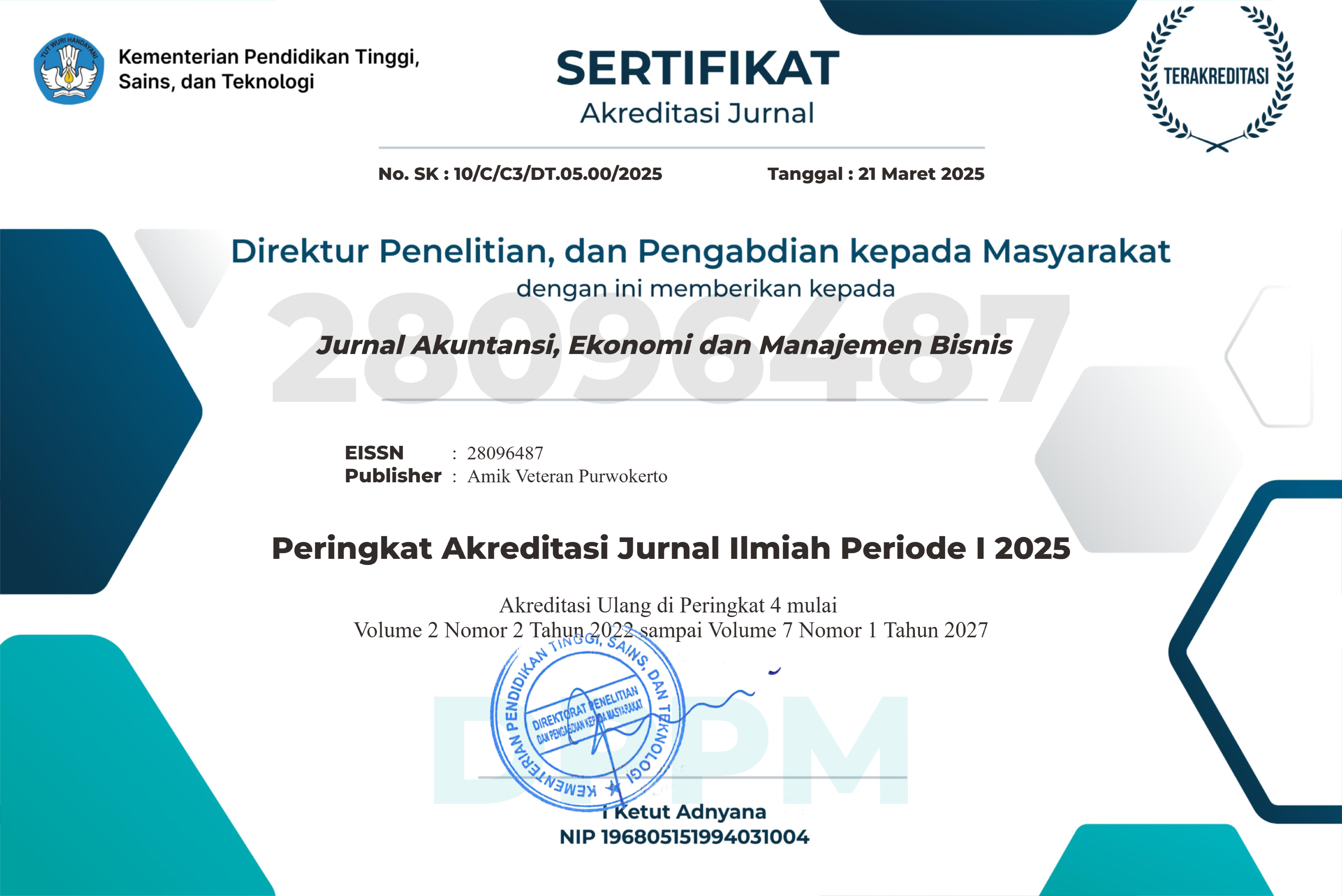PENGARUH SISTEM BAGI HASIL TERHADAP KEPUASAN NASABAH PADA BMT NU JATIM CABANG MLANDINGAN
DOI:
https://doi.org/10.55606/jaemb.v5i1.5693Keywords:
Profit Sharing System, Customer Satisfaction, BMT NU Jatim, Statistical AnalysisAbstract
The Profit Sharing System is one of the main mechanisms in Islamic banking and financial institutions, where profits and risks are shared between the institution and customers based on a predetermined agreement. This study aims to determine the effect of the Profit Sharing System on customer satisfaction at BMT NU Jatim Mlandingan Branch. The method used in this study is a quantitative method with an accidental sampling technique because this method is more practical, easy to apply and efficient in terms of time and cost. Data were obtained through questionnaires distributed to respondents who were customers of BMT NU Jatim Mlandingan Branch. Data analysis was carried out using correlation and significance tests with the help of SPSS software. The results showed that the Profit Sharing System had a correlation with customer satisfaction of 0.280. However, based on the statistical significance test, the P-value of 0.112 (> 0.05) indicated that the effect was not significant. This indicates that the Profit Sharing System is not the only factor that determines customer satisfaction. The conclusion of this study is that although the Profit Sharing System has an effect on customer satisfaction, other factors such as service quality, trust in the institution, and the facilities provided are likely to play a greater role in determining the level of customer satisfaction. Therefore, further research is needed to identify other factors that are more dominant in increasing customer satisfaction at BMT NU Jatim, Mlandingan Branch.
References
Ahmed, R. R., Vveinhardt, J., Warraich, U. A., Hasan, S. S. u., & Baloch, A. (2020). Customer satisfaction & loyalty and organizational complaint handling: Economic aspects of business operation of airline industry. Engineering Economics, 31(1), 114–125. https://doi.org/10.5755/j01.ee.31.1.8290
Arianti, D. W., & Ishak, K. (2020). Pengaruh sistem bagi hasil deposito terhadap persepsi nasabah. JPS (Jurnal Perbankan Syariah), 1(2), 170–179. https://doi.org/10.46367/jps.v1i2.237
Beni, M., & Choiriyah, C. (2021). Analisis penerapan sistem bagi hasil pada pembiayaan mudharabah di PT BPRS Al-Falah Banyuasin. Jurnal BPRS, 2, 159–170. https://doi.org/10.36908/jimpa
Bhaudariya, A. (2022). Customer satisfaction in public and private sector banks: A case study of NCR. International Journal of Health Sciences, 6(5), 2897–2906. https://doi.org/10.53730/ijhs.v6ns5.9282
Faozan, A. (2022). The influence of customer perception about profit sharing, promotion and quality of service on the customer interest in saving at BRI syariah branch purwokerto. Ijtimā Iyya Journal of Muslim Society Research, 7(2), 141–160. https://doi.org/10.24090/ijtimaiyya.v7i2.8085
Fathurrohman, M. S. (2020). The case for fully-fledged profit-loss sharing banking. Airlangga International Journal of Islamic Economics and Finance, 3(2), 102. https://doi.org/10.20473/aijief.v3i2.23881
Ghufron, M. L., & Dewi, R. (2023). Analisis baitul maal wat tamwil (BMT) perspektif Al-Qur’an. : : Jurnal Kajian Ekonomi Dan Perbankan, 7(02), 65–85.
Haryanti, R. D., Nengsih, T. A., & Kurniawan, B. (2022). Analisis faktor-faktor yang mempengaruhi pembiayaan bagi hasil pada bank umum syariah indonesia. AKUA: Jurnal Akuntasi Dan Keuangan, 1(3), 370–382. https://doi.org/10.54259/akua.v1i3.1034
Hidayati, S D., Hafidah, Q., Qosim, M N., & Makruf, I. (2023). Analisis validitas instrumen kuesioner permainan tebak kata dalam pembelajaran mufradat di kelas 3 SMP MBS AR Fachruddin Yogyakarta. Rayah Al-Islam, 7(3), 1377–1381. https://doi.org/10.37274/rais.v7i3.844
Ningtyas, D. W. (2022). Penerapan prinsip 5C pada resiko pembiayaan murabahah di bmt istiqamah tulungagung dan bmt pahlawan tulungagung. Musyarakah: Journal of Sharia Economic (MJSE), 2(2), 100–108. https://doi.org/10.24269/mjse.v2i2.6816
Nursania, D. (2023). Bmt sebagai lembaga keuangan syariah. Islamic Circle, 3(2), 63–71. https://doi.org/10.56874/islamiccircle.v3i2.1138
Ramadhan, M. F., Siroj, R, A., & Afgani, M. W. (2024). Validitas and reliabilitas. Journal on Education, 6(2), 10967–10975. https://doi.org/10.31004/joe.v6i2.4885
Rustamana, A., Wahyuningsih, P., Azka, M. F., & Wahyu, P. (2024). Penelitian metode kuantitatif. Sindoro Cendikia Pendidikan, 5(6), 1–10. https://doi.org/10.9644/sindoro.v4i5.3317
Sari, N., Fatimah, F., & Harjoni, H. (2023). Konsep dan permasalahan bagi hasil pada perbankan syariah di indonesia. Journal of Islamic Economics, 2(2), 65–82.
Septia, E., Fasa, M. L., & Suharto, S. (2023). Pengaruh kualitas pelayanan terhadap kepuasan nasabah. Jurnal Akuntansi, Manajemen, Bisnis Dan Teknologi (AMBITEK), 3(1), 53–62. https://doi.org/10.56870/ambitek.v3i1.65
Susilo, A. S., & Pertiwi, D. A. (2023). Peranan customer service dalam meningkatkan kepuasan nasabah terhadap pelayanan perbankan di PT. bank rakyat indonesia (persero) TBK unit tehoru cabang masohi maluku tengah. Jurnal Pengabdian Kepada Masyarakat UBB Vol. 10 No.1 Desember 2023, 10(1), 42–50.
Downloads
Published
How to Cite
Issue
Section
License
Copyright (c) 2025 Jurnal Akuntansi, Ekonomi dan Manajemen Bisnis

This work is licensed under a Creative Commons Attribution-ShareAlike 4.0 International License.








